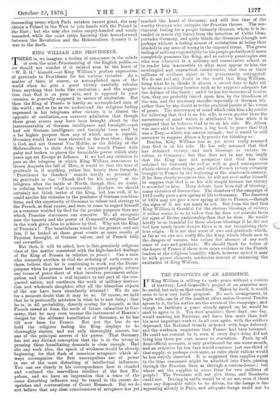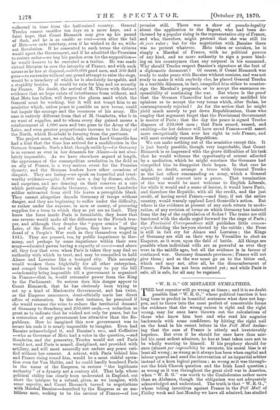THE PROSPECTS OF AN ARMISTICE.
IF King William is willing to make peace without a cession
of territory, Lord Granville's project of an armistice may be useful, but only on that condition. Taken by itself, it would seem to be a very futile proposal. No such arrangement, to begin with, can be of the smallest effect unless General Trochu agrees to it, for his sorties are the events of the campaign ; and except to facilitate a peace already agreed on, he would be mad to agree to it. Ten days' armistice, three days', one day, would unstring his Parisians, and leave him more than half his most important work to do all over again, with the soldiers depressed, the National Guards sickened with hope deferred, and the workmen suspicious that France had been betrayed. He could not consent to it, even if every day's delay did not bring him three per cent. nearer to starvation. Paris, by all demi-official accounts, is only provisioned for one more month, and an armistice for ten days would consume just one-third of that supply, or perhaps even more, as rules about rations would be less strictly observed. It is suggested that supplies equal to the time consumed might be admitted into Paris, passing through the Prussian lines as through a custom-house ; but where are the supplies to come from for two millions of people ? The Prussians will not give them, and Gambetta could not. Driving in cattle would be of no use, even if there were any disposable cattle to be driven, for the forage is dis- appearing already in Paris, and adequate forage could not be collected in time from the half-ruined country. General Trochu cannot sacrifice ten days on a mere hope, and a faint hope, that Count Bismarck may give up his pound of flesh, and he is as unable as ever—even after the fall pf Metz—to cede territory, even if he wished to do so, with- out Revolution. If he consented to such terms the citizens would upset the Government, and if he admitted the Prussians to restore order—we beg his pardon even for the supposition— he would deserve to be executed as a traitor. He was made virtual Dictator to save the integrity of France, and with such means as he has at disposal,-300,000 good men, and 300 field guns—to surrender without one grand attempt to raise the siege, would be a treachery of which he is absolutely incapable, and a stupidity besides. It would be ruin for him and no security for France. No doubt, the arrival of M. Thiers with distinct evidence that no hope exists of interference from without, and that Metz has fallen, will deepen the gloom amid which the General must be working, but it will not tempt him to an armistice which, unless peace is possible on new terms, could but impair the courage and the resources of his army. His case is entirely different from that of M. Gambetta, who is in no want of supplies, and to whom every day gained means a reinforcement of 4,000 men and two guns to the Army of the Loire, and even greater proportionate increase to the Army of the North, which Bourbaki is forming from the garrisons.
The project must, we submit, fail, unless Lord Granville has had a hint that the time has arrived for a modification in the German demands. Such a hint, though unlikely—for Germany is as earnest as ever in her demands for Alsace—is not abso- lutely impossible. As we have elsewhere argued at length, the appearance of the cosmopolitan revolution in the field as an ally of France, is a very serious event for the Prussian dynasty, and the German leaders have other occasions of disquiet. They are losing—we speak on impartial and trust- worthy evidence—quite 1,000 men a day by disease, shells, and surprises, and are drawing on their reserves at a rate which profoundly disturbs Germany, where every Landwehr soldier subtracted from civil life leaves a perceptible blank. They cannot altogether denude Germany of troops without danger, and they are beginning to suffer under the difficulty, or rather under the expense, in men or money, of procuring supplies for a term to which they as yet see no limit. They know the force inside Paris is formidable, they know that one reverse would make all the difference to the French tem- per, and although they despise the " paper armies " of the Loire, of the North, and of Lyons, they have a lingering dread of a People's War such as they themselves waged in 1815. They are pressed, too, by public impatience in Ger- many, and perhaps by some impatience within their own army—educated pawns having a capacity of ennui—and above all, they fear that even when Paris is taken they may find no authority with which to treat, and may be compelled to hold Alsace and Lorraine like a besieged city. This necessity would weaken them frightfully for all other enterprises, and compel them besides to ask Germany to pay the bill —indemnity being impossible till a government is organized in France—that is, would retransfer power from the King to the Parliament. So serious does this danger appear to Count Bismarck, that he has obviously been trying to set up a kind of Marionette Government, and has twice, as the Empress announces, demi-officially made her direct offers of restoration. In the first instance, he promised if she would resume the reins to reduce the territorial demand of Germany to Strasburg and 250,000 souls,—a reduction so great as to indicate that he wished not only for peace, but for a restoration of any government less attractive than the Re- publican. How he imagined this new government was to secure his ends it is nearly impossible to imagine. Even had Bazaine acknowledged it, and Bazaine's men, and Coffiniere —who as Governor of Metz had a voice in the question, —and Gambetta, and the peasantry, Trochu would not and Paris would not, and Paris is armed, disciplined, and provided with artillery, and will most assuredly not endure any peace rati- fied without her consent. A retreat, with Paris behind him and France rising round him, would be a most riskful opera- tion even for Von Moltke, and he could hardly bombard Paris in the name of the Empress, to restore " the legitimate authority " of a dynasty not a century old. That lady, whose political ability has clearly been underrated in England, cut short the intrigue by a refusal, given, as we imagine, with some asperity, and Count Bismarck turned to negotiations with Marshal Bazaine—described by the Empress as an am- bitious man, seeking to be the saviour of France—of less
promise still. There was a show of pseudo-legality about the application to the Regent, who had been de- throned by a popular rising in the representative city of France,. and who, therefore, might pretend that she was still its de jure ruler ; but for the negotiation with Pazaine there was no pretext whatever. Metz taken or untaken, he is
simply a Marshal of France, with no political powers- of any kind, and no more authority to sign a peace bind-
ing on his countrymen than any corporal in his command.
Why should Trochu respect Bazaine's signature at the foot of a diplomatic document ? Of course, if Count Bismarck was ready to make peace with Bazaine without cessions, and was not ready to make it with anybody else, he placed General Trochu in a terrible dilemma, in fact, compelled him either to counter- sign the Marshal's proposals, or to accept the enormous re- sponsibility of continuing the war. But where is the proof that the German Chancellor had so seriously modified his opinions as to accept the very terms which, after Sedan, he contemptuously rejected ? As for the notion that he might yield much merely to put down Republicanism, those who employ that argument forget that the Provisional Government is master of Paris ; that the day the peace is signed Trochu disposes of 250,000 men ; that Paris armed, roused, an& exulting—for her defence will have saved France—will assert more energetically than ever her right to rule France, and will most certainly remain Republican.
We can make nothing out of the armistice except this. It is just barely possible, though very improbable, that Count Bismarck is so impressed with the grave difficulties of his task that he would welcome the opportunity of retreat afforded. by a mediation, which he might convince the Germans had compelled him to disappoint their hopes. In that case he might, no doubt, arrange a truce with General Trochu as the last officer commanding an army, which a General Assembly could convert into a peace. That termination of the war would be most welcome to English Liberals, for while it would end a scene of horror, it would leave Paris, and therefore the Republic, with all the credit, and the just credit, of having saved France,—and they, if not the entire country, would warmly applaud Lord Granville's action. But where is the evidence at present of any such return to mode- ration, of any revision of terms on which Germany has insisted from the day of the capitulation of Sedan ? The trains are still
burdened with the shells urged forward for the siege of Paris ; the Provincial Correspondence still publishes little commu-
niques deriding the lawyers elected by the rabble ; the Press
is still in full cry for Alsace and Lorraine ; the Kings. of Germany are still on their way to Versailles to elect an
Emperor, as it were, upon the field of battle. All' things are possible when individual wills are as powerful as ever they were in the middle ages, but all the evidence is in favour of continued war. Germany demands provinces ; France will not give them ; and so the war must go on to the bitter end,. which end may not, after all, be the dismemberment of France. Paris has not been entered yet ; and while Paris is safe, all is safe, for all may be regained.



































 Previous page
Previous page